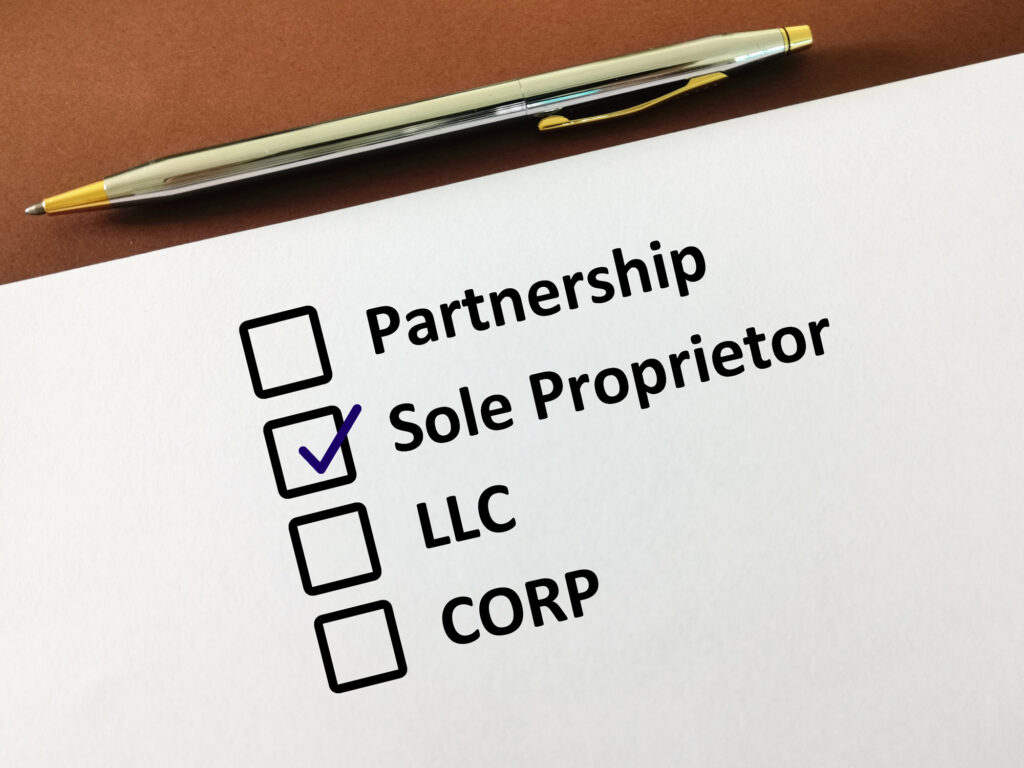
Starting a small business is an exhilarating endeavor, but it comes with critical decisions that can shape the future of your venture. One of the most significant choices you’ll face is determining the right legal structure for your business: LLC vs. Sole Proprietorship
For small business owners, the decision often boils down to two primary options: Limited Liability Company (LLC) and Sole Proprietorship. Each structure has its advantages and drawbacks, making it essential to understand the implications of your choice.
In this article, we’ll explore the key differences between these two business structures, their advantages and disadvantages, and how to decide which one is the best fit for your specific business needs.
Contents
Sole Proprietorship
What is a Sole Proprietorship?
A Sole Proprietorship is the most straightforward business structure, ideal for solo entrepreneurs and small business owners who want complete control over their operations. In this business structure, the business and the owner are considered the same entity. While this simplicity offers advantages such as ease of setup and full control, it also presents significant challenges, notably in terms of personal liability.
Advantages of Sole Proprietorship:
Ease of Formation
Setting up a Sole Proprietorship is often as simple as starting a business. There are very minimal legal formalities and paperwork involved, making it an attractive option for new entrepreneurs.
Direct Decision Making
As the sole owner, you have complete control over all business decisions. You don’t need to consult with partners or shareholders, allowing for quick and agile decision-making.
Tax Benefits
Business profits and losses are reported on your personal tax return. This means you can take advantage of certain tax deductions and credits that may not be available to other business structures.
Less Paperwork and Compliance
A Sole Proprietorship requires the least amount of paperwork and compliance prior to launch. After launch, a Sole Proprietor only needs to keep up with state, federal, and local taxes, and renew business licenses.
Disadvantages of Sole Proprietorship
Unlimited Personal Liability
One of the most significant drawbacks of a Sole Proprietorship is that there is no legal separation between your personal assets and the business. If the business incurs debts or legal liabilities, your personal assets, including your home and savings, could be at risk.
Limited Access to Capital
Sole Proprietorships might face challenges when seeking financing. Lenders and investors often prefer businesses with more formal structures like LLCs, which offer reduced personal liability.
Limited Growth Potential
Scaling a Sole Proprietorship can be challenging due to the limited access to funding and resources. Expanding the business often requires personal investment or taking on substantial personal risk.
Limited Liability Company (LLC)
What is an LLC?
An LLC offers a middle ground between the simplicity of a Sole Proprietorship and the formalities of larger corporations. An LLC provides legal protection for your personal assets while allowing for flexibility in management and taxation, making it an increasingly popular choice for small business owners.
Advantages of LLC
Limited Personal Liability
One of the primary benefits of an LLC is that it provides a legal separation between your personal assets and the business. In case of debts or legal issues, your personal assets are generally protected.
Flexibility in Management
LLCs offer a versatile management structure. You can choose to manage the business yourself, appoint managers, or even involve members without managerial responsibilities. This flexibility allows you to tailor the management style to your specific needs.
Pass-Through Taxation
LLCs enjoy pass-through taxation, meaning business profits and losses pass through to the owners’ personal tax returns. This avoids double taxation, common in corporations, where both the business and dividends are taxed separately.
Credibility and Trust
Having an LLC attached to your business name often instills trust and credibility among customers, suppliers, and potential partners. It signifies a level of professionalism and commitment to your business.
Disadvantages of LLC
Complexity and Cost
Forming an LLC involves more paperwork and legal formalities compared to a Sole Proprietorship. There are also filing fees and ongoing administrative requirements, which might be a burden for very small businesses or startups with limited resources. Also, the cost of filing an LLC differs from state to state. For instance, if you form your LLC in California, the cost is $70, whereas, if it’s in New York, the cost would be around $200.
Tax Complexity
While pass-through taxation is a significant advantage, LLCs can sometimes face complex tax situations, especially if there are multiple members with different levels of involvement and financial contributions.
Potential Disputes
In multi-member LLCs, conflicts and disputes among members can arise, especially concerning decision-making powers, profit distribution, and the overall direction of the business. Properly drafted operating agreements are crucial to mitigating these issues.
Factors to Consider When Choosing the Right Structure
Deciding between an LLC and a Sole Proprietorship should be based on careful consideration of various factors:
Risk Tolerance
If your business involves significant risks, an LLC provides a vital layer of protection for your personal assets, making it a safer choice.
Tax Implications
Consider the tax implications of each structure. While both offer pass-through taxation, your individual tax situation, including deductions and credits, might influence your decision.
Long-Term Business Goals
Consider your business’s long-term growth prospects. If you plan to expand and attract investors, an LLC offers more credibility and flexibility. Sole proprietorships are often seen as better for small, one-person businesses with no plans for significant expansion.
Management Style
Evaluate your preferred management style. If you prefer complete control and minimal bureaucracy, a Sole Proprietorship might be suitable. If you value collaboration and flexibility, an LLC could be the better choice.
Compliance and Regulations
Consider the regulatory requirements and compliance obligations associated with each structure. An LLC generally requires more paperwork and adherence to formalities.
Exit Strategy
Your exit strategy should also influence your decision. If you foresee selling the business or bringing in partners in the future, an LLC is a more suitable option. A sole proprietorship can be more challenging to transition or sell.
Hybrid Options
It’s worth noting that in some cases, you may have the option to switch or combine business structures. For example, you could start as a sole proprietorship and then convert to an LLC as your business grows. This allows you to test the waters and change your structure as needed.
Consulting with a legal or financial advisor can help you navigate these transitions effectively.
Conclusion
Choosing the right business structure is a critical decision that significantly impacts your small business’s success and your personal financial well-being. Both LLCs and Sole Proprietorships have their merits and drawbacks, so it’s essential to weigh your options carefully.
If you prioritize simplicity and direct control over the business and are comfortable with the associated personal risks, a Sole Proprietorship might be the right choice for you. However, if you value legal protection for your personal assets, flexibility in management, and access to external funding, an LLC could be the ideal structure for your small business.
Ultimately, consulting with legal and financial professionals is crucial when making this decision. Their expertise can provide personalized guidance tailored to your specific business needs, ensuring that you embark on your entrepreneurial journey with confidence and security.
Featured Image Credit: Deposit Photos





